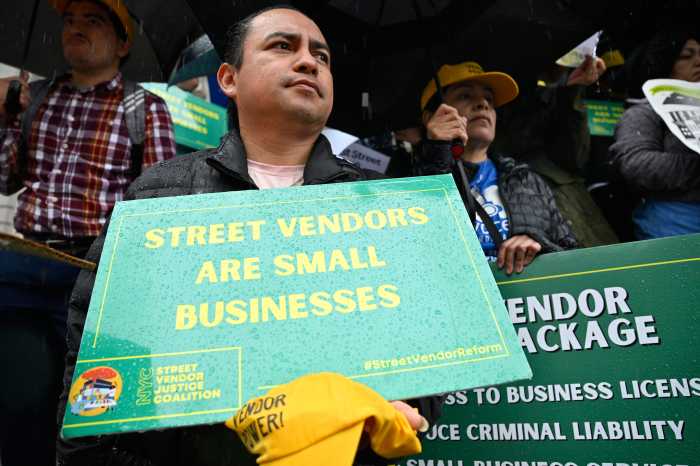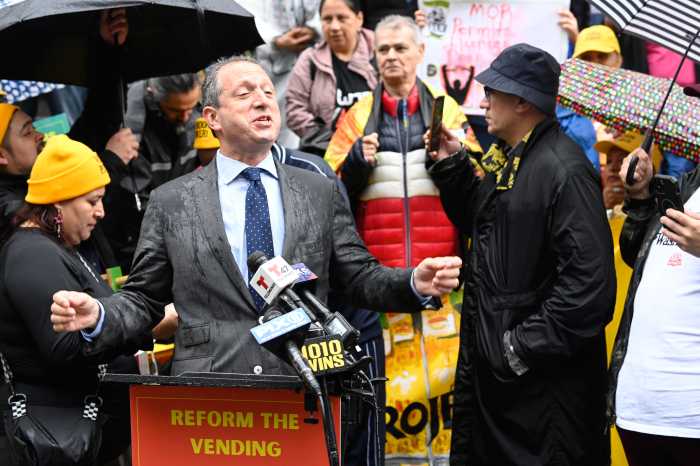Greater than 100 distributors, restaurant homeowners and different advocates took over the steps of Metropolis Corridor on a wet Tuesday morning, calling for a serious overhaul of the town’s longstanding insurance policies on avenue merchandising.
Activists from teams together with the Road Vendor Challenge, elected officers and street-vendor supporters made positive that their voices had been heard on Might 6 to advance the Road Vendor Reform Package deal, which incorporates Intro 431, a invoice that might enhance the variety of meals vendor licenses and common vendor licenses out there annually for 5 years.
Advocates additionally known as for the passage of Intro. 408, which might require NYC’s Small Enterprise Providers (SBS) to supply a division centered on instructional outreach to assist distributors navigate the allowing course of.
The group flooded the steps of Metropolis Corridor in Decrease Manhattan prematurely of a Metropolis Council committee listening to on shopper and employee safety concerning the proposed laws.
Bronx Council Member Amanda Farias is the prime sponsor of Intro 1251, a invoice that’s a part of the Road Vendor Reform Package deal that requires extra meals licensing purposes annually. Pursuant to Native Legislation 18 of 2021, the town’s Division of Well being and Psychological Hygiene should make 445 supervisory license purposes out there to potential cellular meals distributors yearly inside a 10-year interval from 2022 by way of 2032. Intro 1251 would develop the variety of purposes to make sure extra licenses are given out annually.
“These are entrepreneurs, job creators, and culture bearers, but they’ve been trapped in a broken, discriminatory system for far too long,” Farias mentioned. “Intro 1251 ensures the city fulfills its commitment under Local Law 18 by issuing real food vendor licenses, not just applications.”
Road merchandising licenses are practically unimaginable to achieve
NYC requires enterprise homeowners to have a Normal Vendor License to promote items or companies in a public place that isn’t a retailer. However getting a allow shouldn’t be simple.
The town caps common vendor licenses for non-veterans at 853, and meals vendor permits at round 3,000. The ready record to obtain both license is within the 1000’s.
Some avenue distributors have been ready many years to get authorized permits — and so they mentioned Tuesday they don’t wish to break the regulation to make a residing.
“It’s been 35 years that I’ve been trying to get a license,” Calvin, a avenue vendor from Harlem who sells rings, hats, chains and related objects, defined. “It’s a major problem. I want to be able to support my family like anyone else. And I want to do it legally, not illegally.”
Calvin, a avenue vendor from Harlem, mentioned he has been making an attempt to acquire a merchandising license for 35 years.Photograph by Lloyd Mitchell
The Road Vendor Challenge says there are about 23,000 avenue distributors in NYC, most of whom are meals distributors. About 75% of meals distributors and 37% of common merchandise distributors are unlicensed.
Advocates attribute the unlicensing to the cap legal guidelines handed in 1979 and 1983, which restrict the variety of licenses the town distributes. Each advocates and a few metropolis officers have mentioned {that a} lack of permits additionally results in an absence of presidency regulation and oversight of distributors promoting meals and different items.
Mohamed Attia, director of the Road Vendor Challenge, mentioned the proposed laws, saying it could be a triple win for the town, distributors and prospects.
“We’ve seen incredible success in our community education outreach when we can equip vendors with information, tools and a clear path to follow, they know how to operate and can focus on what they love, making their food and serving their community,” Attia mentioned. “Vendors are eager to work together with city leaders to modernize this system so it efficiently serves all New Yorkers.”
He additionally described how the system, as it’s now, is “set up to fail” everybody. However Intro 431 would reform the method by steadily opening up licenses and permits, creating 1,500 new common vendor licenses and 1,500 new licenses for meals distributors each 5 years.
“After that, the city will pretty much eliminate the waiting list; there will be no more waiting list, people can access the permits and licenses right away,” he defined.
 Road distributors rally at Metropolis Corridor.Photograph by Lloyd Mitchell
Road distributors rally at Metropolis Corridor.Photograph by Lloyd Mitchell
For a lot of avenue distributors who converse English as a second language, securing the correct permits and licenses for his or her gross sales turns into much more troublesome on prime of a fancy system of guidelines and processes to navigate.
That is the place Intro 408 is available in.
Public Advocate Jumaane Williams defined that the invoice would set up a division with SBS to supply assets, coaching, and academic supplies to avenue distributors to assist them legally promote merchandise and meals.
“These services are essential in keeping both street vendors and consumers safe,” he mentioned.
Public opposition to unlawful avenue merchandising
Many New Yorkers are supportive of the road merchandising reforms however commented that they’ve issues surrounding it when it’s performed illegally.
New Yorker Margot Brie instructed New York News final month that she is most involved about security and whether or not distributors promoting meals are sustaining acceptable cleanliness requirements.
“We have observed vendors cutting mangoes with the same knife and no water to clean it,” she mentioned. “Also, vendors handle food and fruit with bare hands, sometimes sneezing into them or touching everything in sight. I’m amazed more people don’t get sick from all the bacteria and unsanitary conditions.”
Based on NYC Division of Sanitation officers, the company acquired 22,000 complaints final yr about unlawful merchandising.
The NYPD issued tons of of summonses within the transit system alone in the course of the first 4 months of the yr.
“Vending within the transit system is unlawful, and the NYPD continues to address this condition through enforcement, which may include ejection, summons, and/or arrest,” a spokesperson for the NYPD’s Deputy Commissioner of Public Info mentioned. “The NYPD has issued over 300 summonses this yr for illegal promoting or soliciting in transit.
Mayor Eric Adams mentioned throughout a Tuesday press briefing that group members have complained about too many unlawful distributors organising outlets on native streets, together with close by companies and outlets.
“When we deal with vendor licenses, it’s coming from the community,” he mentioned. “People don’t want to see a freefall in their community around vending. It is the community that called us when you saw the Brooklyn Bridge lined up with vendors.”
The mayor mentioned why the permits should comply with a sure course of with guidelines and tips as a way to be honest to all enterprise homeowners within the metropolis.
“We must have a fair vendor system, but it can’t be a free-for-all,” Adams mentioned. “So, those who are saying, ‘Just give vendor licenses to everyone, we’re not going to do that. We’re going to monitor, make sure it’s done correctly and it has to create the atmosphere that businesses are thriving in the city.”
Potential financial advantages
In the meantime, researchers on the metropolis’s Unbiased Finances Workplace lately estimated that passing the reform package deal might have a web income impression of $59 million to the town financial system annually.
 Metropolis Comptroller Brad Lander speaks in assist of avenue distributors at Metropolis Corridor.Photograph by Lloyd Mitchell
Metropolis Comptroller Brad Lander speaks in assist of avenue distributors at Metropolis Corridor.Photograph by Lloyd Mitchell
Metropolis Comptroller Brad Lander, a mayoral candidate this yr, doubled down on the constructive impression authorized avenue merchandising has on the financial system, including that he helps the complete reform package deal.
“If we issued licenses to all the street vendors currently on the wait lists, New York City would generate nearly $60 million revenue,” he mentioned. “We must address the structural issues at the root of this problem, bringing us towards creating a functioning regulatory system, ensuring our public spaces are clean and accessible and helping our smallest businesses to stabilize and flourish.”






